The Sustainability Advantages of a Majority-Owned Supply Chain in the Apparel Industry
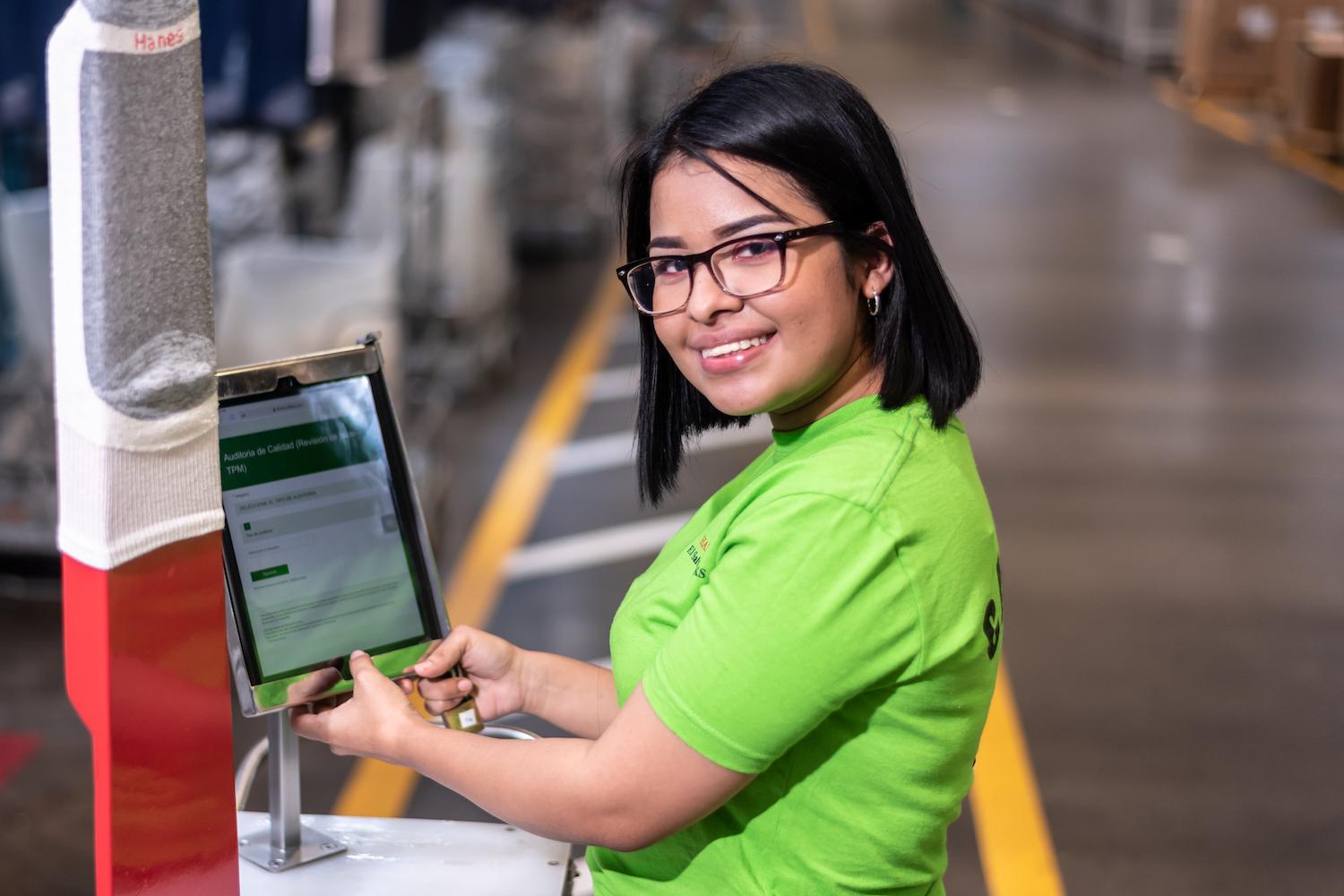
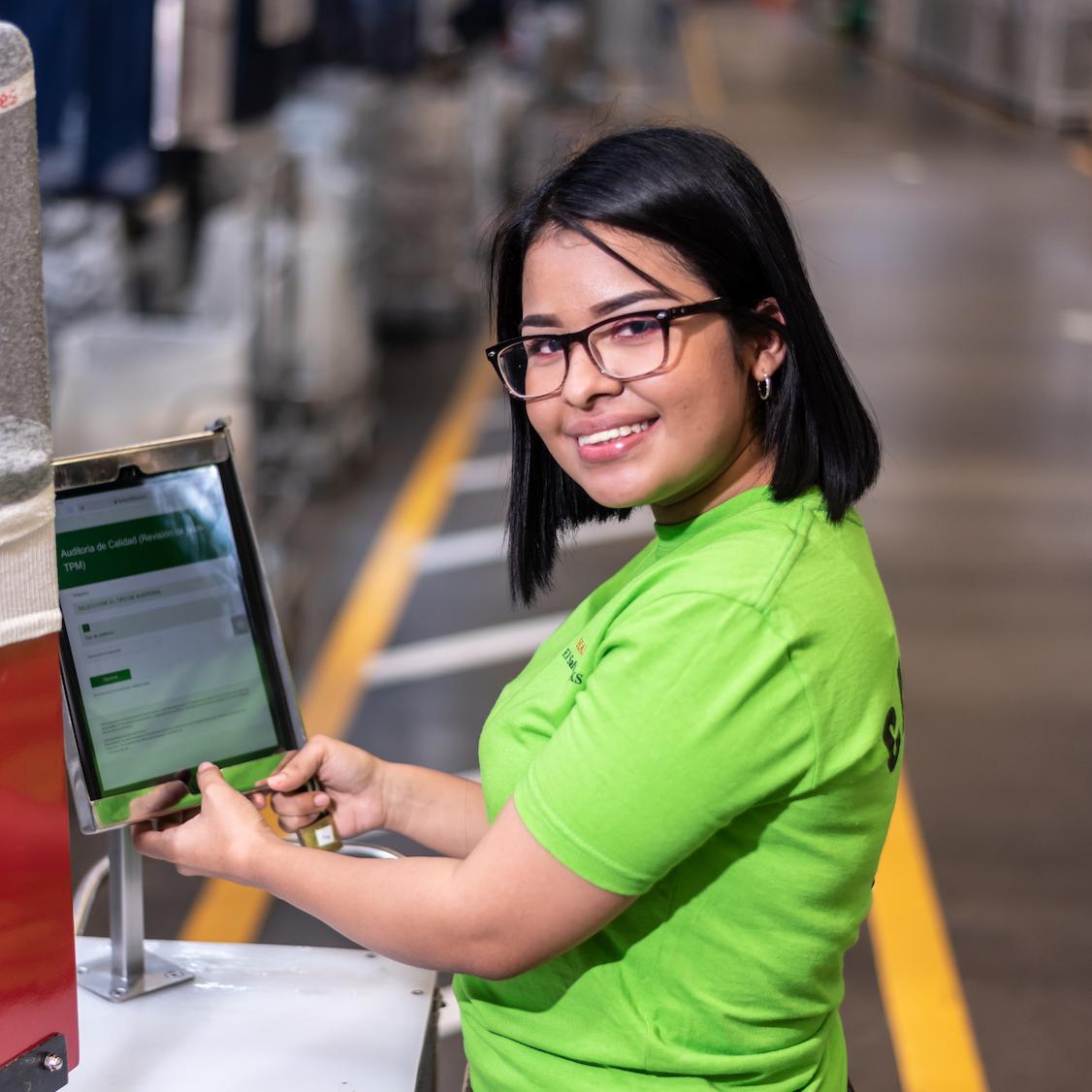
The apparel industry is well known for extensive supply chains, often with a reputation for unsustainable practices. While many apparel companies are just now making efforts to implement sustainability into their business models, HanesBrands says it has for decades been a sustainability leader in the industry. Unlike other companies in the sector, HanesBrands is in a unique position to implement extensive sustainable practices — due largely in part to a majority ownership of its supply chain.
Approximately 70 percent of HanesBrands’ total unit volume comes from facilities owned or controlled by the company directly. The breadth of this ownership means that the company has the opportunity and responsibility to implement direct and meaningful change.
Through a focus on energy and resource efficiencies and investments in biomass renewable energy to fuel textile mills in El Salvador and the Dominican Republic, HanesBrands has reduced energy usage by 33 percent and Scope 1 and 2 greenhouse gas emissions by 50 percent since 2007, with 48 percent of the company’s energy now being sourced from renewables worldwide. Water efficiency projects have resulted in a 36 percent percent reduction in water use since 2007, which in turn has fueled a further reduction in energy consumption.
These significant investments in energy and manufacturing facility infrastructure have helped to significantly move the needle on the company’s sustainability goals. The impact of HanesBrands’ majority supply chain ownership has also laid the foundation for direct and immediate impact to the business. So why did the company invest so heavily in these projects? “First and foremost, it generated really significant cost savings to the tune of hundreds of millions of dollars. Because we own these assets, we have been the direct beneficiary our invested capital dollar, said Chris Fox, HanesBrands’s chief sustainability officer.
HanesBrands’ unique supply chain ownership ensures that the company’s sustainability strategy extends beyond stakeholder engagement as a means of corporate responsibility. Direct control of these facilities means that sustainability can be integrated directly into the company’s business model and ultimately its bottom line.
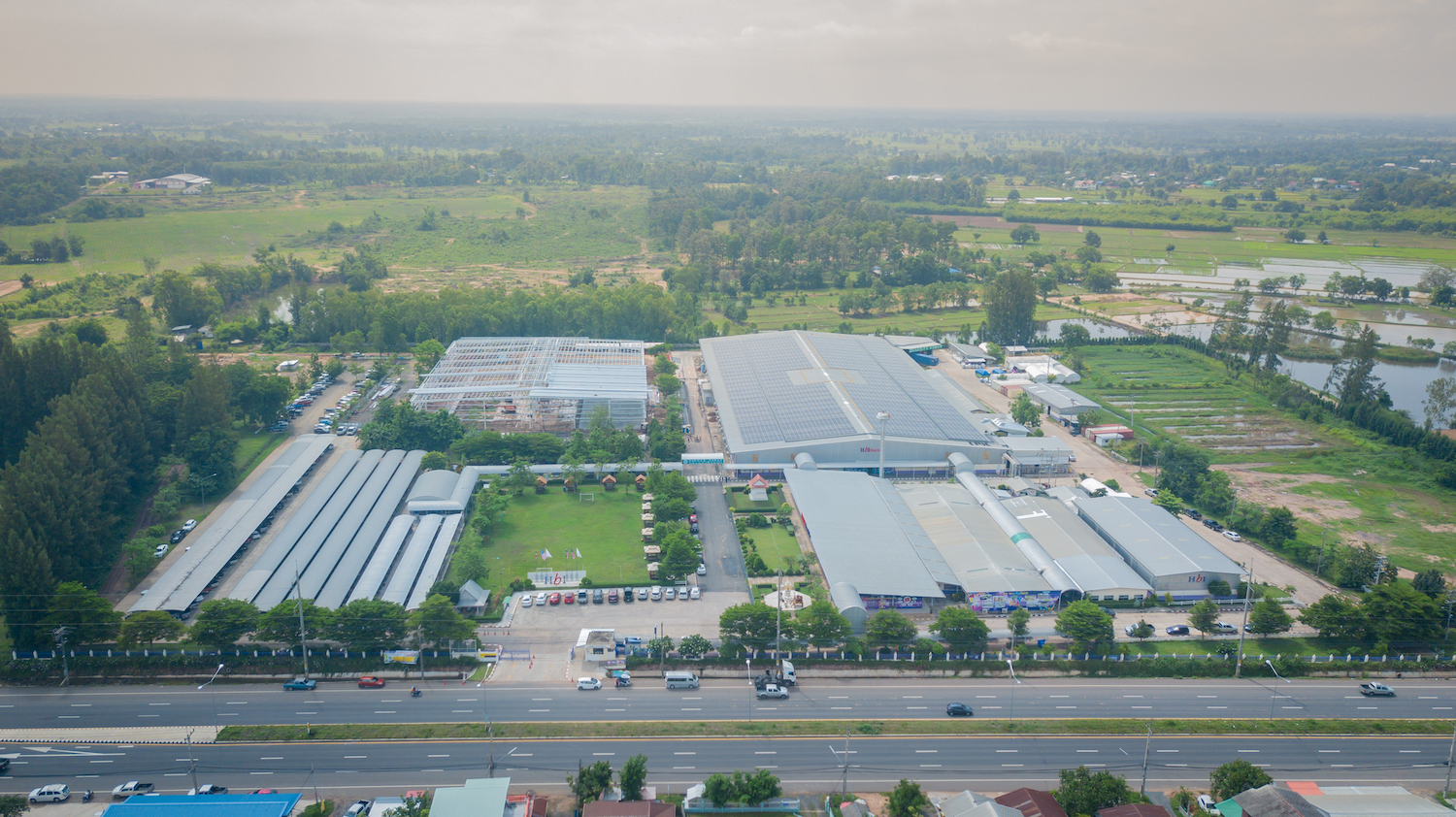
While the majority of HanesBrands’ supply chain lies under its direct control, the company says the remaining 30 percent is not immune to the scrutiny of its sustainability vision. From the responsible sourcing of cotton, 61 percent of which is grown in the United States, to the preference of land and sea transportation in lieu of air as a means of reducing greenhouse gas emissions, to the company’s work with third-party groups such as the Fair Labor Association, HanesBrands says its entire supply chain is assessed through the lens of sustainability.
The final piece of HanesBrands’ supply chain — consumer use — is one where the company is proactively reaching out to consumers, primarily through active awareness-building. “Convincing the consumer to wash in cold water, for example — there is no greater impact that any of us can have on carbon emissions generated to make and care for apparel,” Fox said. “Hanes has teamed up with Tide to educate consumers about the small steps we all can take, like washing clothes in cold water. About half of the total greenhouse gas emissions generated over the life cycle of apparel comes from heating water in the laundry room.”
On a broader scale, HanesBrands understands that innovations in supply chain sustainability extend beyond the bottom line. With the advantages of its significant market share, majority supply chain ownership and affordable products, HanesBrands’ business model not only brings necessary innovations to the apparel industry, but also allows consumers to vote with their dollar and purchase affordable products that support future innovations in sustainable apparel supply chains.
“Our model is bringing sustainability to the masses. It is sustainability at a much more affordable price point,” Fox said. “Through our efforts, we want the consumer to be able to know and trust that they are buying truly sustainable products because of the breadth of our overall sustainability processes and program — and that it really can be affordable. Sustainability can be affordable for everybody.”
HanesBrands has a significant advantage in implementing sustainability within its supply chain. While most other companies in the apparel industry do not have this level of direct and immediate impact, HanesBrands’ initiatives can serve as a lesson to the sector that investment in innovation, resource efficiency, and consumer awareness are more than the bastion of corporate sustainability reports. Sustainability as value can help shape the company ethos, but utilization of sustainability as a business model ensures lasting and industry-wide change.
This article series is sponsored by HanesBrands and produced by the TriplePundit editorial team.
Images courtesy of HanesBrands
Across the Pond, Leon Keeps Redefining Fast Food for the Better
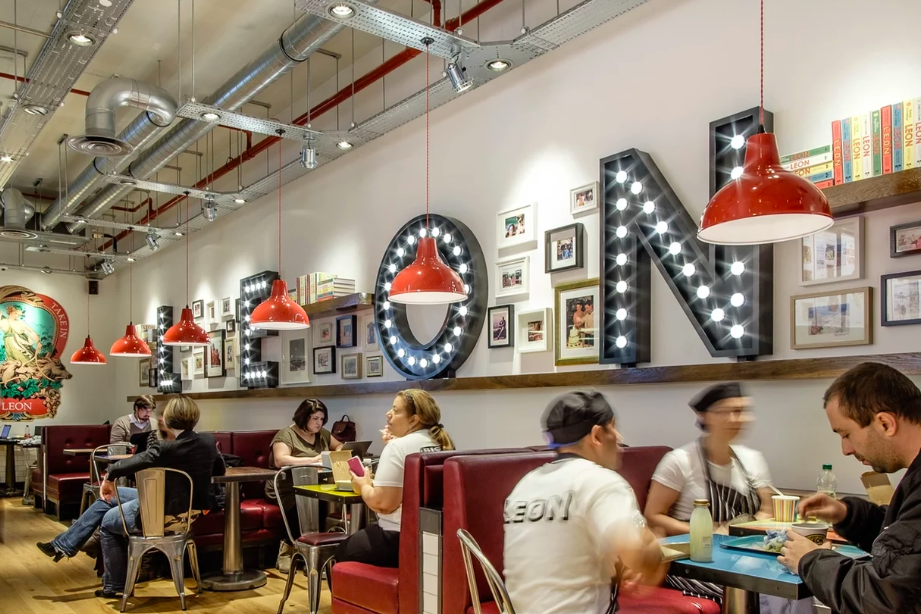

As is the case with just about everything affecting our budgets, the cost of fast food surged during 2022 — on average about 8 percent, according to the National Restaurant Association. Food service companies can explain away all they want, but the rising cost of a combo meal hasn’t necessarily occurred due to sourcing locally or focusing on making menu items more nutritious. There is one company, however, that is definitely focused on healthier fare and more creative menu items — it’s just that you’ll have to fly across the Atlantic to visit one of Leon Restaurants’ locations.
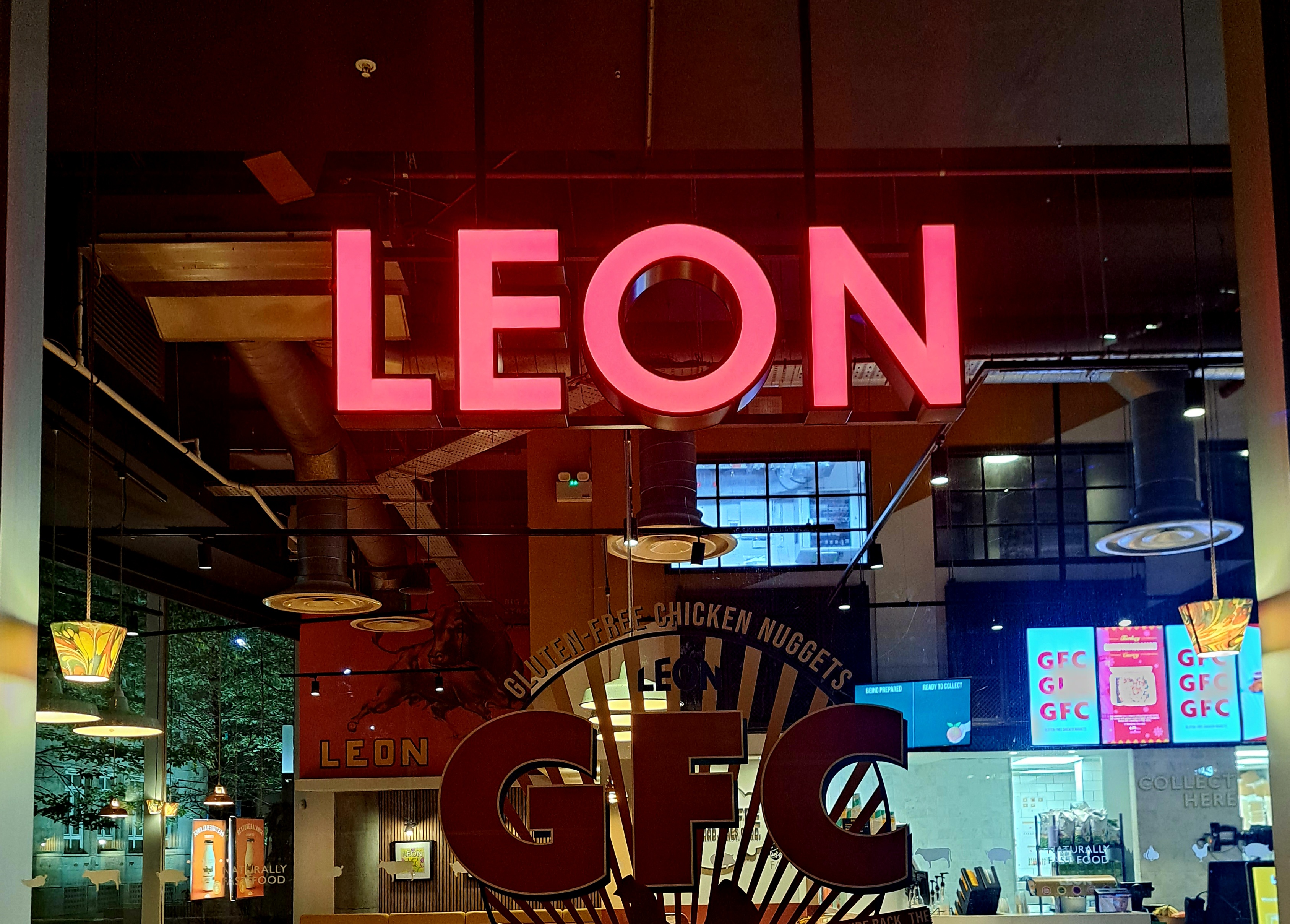
Branded as “LEON,” the company, now a part of EG Group, has been serving fast, tasty and reasonably priced meals and coffee in the U.K. since it was founded almost 20 years ago. Leon hasn’t done away with the fast food staples such as chicken nuggets and fries; rather, it’s repacked them, spiced them up literally and figuratively, and keeps rolling out menu items that appeal to carnivores, omnivores and herbivores. While most fast food companies that have gone global have tailored their menus abroad to appeal to local tastes, Leon has turned that idea on its head: Reflecting the diversity of today’s U.K., there’s just about something for everyone at Leon (while avoiding the voluminous menus at chains such as Cheesecake Factory and TGI Friday’s that in the end have menu items that all taste the same anyway).
Vegans can sample a modern wrap take on the British classic bauble and squeak. Vegetarians don’t have to settle for processed cheese, as they can partake of Leon’s grilled halloumi wrap (shown below). And for those who struggle to settle for something other than a burger, wraps that offer a legit nod to Caribbean jerk fare or Korean street food also have options. Yes, there’s meat on the companies’ menu across its 70-plus restaurants, but Leon insists that a plant-based diet is behind its mission.

While we’re on the topic of the company’s mission, Leon has taken on its own social impact work, including its drive to make school lunches across Britain healthier or helping kids beset by restrictive diets on how to cook. That mission also extends to the company’s sourcing: Leon serves and sells ground coffee that is fair trade- and organic-certified. Plus, we’ve got to mention the aesthetics — the typical Leon location is no cookie-cutter, sad fast food outlet. Most of Leon’s locations are airy and boast pops of color that encourage you to enjoy the space rather than eating while hiding in your hoodie and hope no one you know sees you breaking your anti-fast food stance.
Leon keeps growing across Britain and despite the hard knocks that the U.K. economy keeps on taking, the company is bullish about its future. For those Yanks who have ventured to London and have been smitten by the menu and even brought bags of its coffee home (present company included), we’ll have to wait a while until Leon ventures westward. The company opened its first Washington D.C. store in 2018 (while touting Pippa Middleton as a fan) and had bold plans to expand across the U.S., but the global pandemic’s impact quashed its overseas growth strategy. So far there is no word on a U.S. return, though in 2021 Leon’s CEO floated the possibility of an eventual return to North America, perhaps in a different region.
As a side note, Leon also offers an exclusive perk — 10 percent off the menu if your name is Leon; at Heathrow Airport, if your name is Leon, you should be able to sweet talk them into a free coffee with the purchase of a meal before your flight.
Image credits: Leon Kaye; Leon Restaurants' website
Declining Birth Rates Have an Economic Impact — but This AI Concept Isn’t an Answer


Aspiring scientist Hashem Al-Ghaili is plotting to take the humanity out of human reproduction by replacing pregnancy with artificial wombs run by apps and artificial intelligence (AI) in his proposed EctoLife baby factory. Although the Matrix-esque facility is only a concept at this point, Al-Ghaili is already preying on fears of maternal mortality and declining birth rates to promote acceptance of his plan to commodify human biology. Naturally, the planet’s worst billionaire supports the notion as a “viable and likely needed” (according to Forbes) solution to his biggest fear — the impending peak and decline of population growth. And while said billionaire frets publicly over how to colonize Mars with fewer desperate workers available, the push for continued population growth even as the climate crisis rages and resources dwindle demonstrates just how broken the current economic system is. Instead of allowing AI and tech to manufacture future consumers to keep profits from plummeting, perhaps we should consider creating societies that are more conducive to families and children.
To be clear, Al-Ghaili is a “science communicator” — a man of media, not tangible invention. His EctoLife concept represents a theory based on decades worth of work by reproductive scientists. To the cynical, this method will be reminiscent of that same plutocrat who spearheads technology in a way that falsely conflates cutthroat business practices with actual scientific contributions.
But it also represents a real threat as the cults of personality that have sprouted up around rich men with big opinions could very well result in the commodification of human existence down to the most basic level. And while Al-Ghaili plays on fears of infertility in order to pander for support of his proposed baby farm, there is at least one promise from the YouTube video which makes it abundantly clear that his ultimate goal is to replace the entirety of natural human reproduction with products gestated in synthetic wombs.
"With EctoLife, premature births and C-sections will be a thing of the past," a woman’s voice narrates as the video pans over row after row of computer-generated images (CGI) of babies gestating in transparent plastic growth pods that look like something out of The Matrix. But how can c-sections and premature births be a thing of the past as long as there is human pregnancy? How can that be unless ALL babies are produced via fake wombs? Just as electric cars were never really about saving the planet, Ectolife has nothing to do with some grand compassion for the plight of those who bear children or infertile couples — rather, it’s all about greed.
Likewise, that the video presents EctoLife as a solution for declining birth rates when women are increasingly choosing not to have children — not because of pregnancy, but because they do not want the burden of raising children — demonstrates just how out of touch Al-Ghaili is with the very issue that is his excuse for attempting to hijack pregnancy.
It’s no surprise then that recent Twitter exchanges on the topic featured a series of men jumping on board with fake wombs, many of them in the name of “equality”. Of course, taking female pregnancy out of the picture is not going to change the nature of who gets stuck with the bulk of childcare and household duties — that is a ridiculous notion. So, it’s no surprise that those most affected are conspicuously absent from the conversation — with the idea being pushed not by people with uteruses, but by rich men and their simps.
As if all this isn’t bad enough, EctoLife also boasts gene-editing technology so that the future can be populated by genetically modified babies and parents never have to be disappointed by a child who comes out too short, too dumb or with a disability. The future, according to Al-Ghaili, is apparently eugenics. Is it any surprise then that all of the CGI pod babies in his YouTube video have white skin?
Knowing what we know about the world’s lower birth rates and the changing demographics of people choosing not to be mothers — not because of pregnancy, but because of everything else entailed — breeding humans in synthetic womb farms raises other dystopian possibilities as well. If fewer people want families but billionaires demand population growth, how long until they just set up their own EctoLife facility and grow their own Mars colonists? How long until a despot uses the technology to produce an army of GMO soldiers?
And that’s not to mention the unknown consequences of being gestated in an artificial womb versus a human body. It’s not unreasonable to wonder if such babies would experience emotional, social or mental deficiencies that could affect their bonding and development in a similar manner as children raised in orphanages. Just as a Romanian experiment demonstrated children’s intrinsic need for love and interaction, it should also serve as a warning against meddling with our basic biology.
While infertility is a real problem for many couples who do want to start a family, synthetic wombs are not the answer. Rather, we must look to the root cause of increasing infertility and fix the structural problems that are leading people to put off procreation until they are financially stable but no longer able to conceive naturally as well as the lifestyle and environmental factors that are leading to reduced male fertility.
At present, the EctoLife concept cannot proceed beyond fantasy in rich men’s heads as research on human embryos is only allowed until the two-week mark. Still, Al-Ghaili is hoping that ethical restrictions will be lifted soon enough to allow lab-grown babies to hit the market in the next ten years.
Image credit: Jhon Macias via Pexels
Apologies from Southwest Fall Flat Amid Lack of Purpose and Positive Change


A logjam of Southwest 737s on December 27, 2022 at Santa Barbara Municipal Airport. On a typical day, there are six Southwest arrivals and 6 departures at Santa Barbara, and rarely more than one of the airline's 737 at the airport at the same time.
Southwest is attempting to appease holiday travelers who were stranded in the airline’s latest fiasco with frequent flier miles and a mediocre, excuse-laden apology — but its pilots’ union (Southwest Airlines Pilots Association, SWAPA) is having none of it. They’ve called leadership out — referring to executive management as a cult in a letter that lists the ways their failures have led to the brand’s persistent problems. Instead of investing in much-needed technological upgrades and staffing, the letter accuses the airline of “maximizing shareholder return” at their expense. Like all corporate entities, Southwest has a duty to its employees and customers first. The airline’s massive disruptions will likely continue until it recognizes the need for corporate responsibility and purpose beyond enriching shareholders and stock buybacks.
Extreme winter weather caused a wave of cancellations across airlines this holiday season — although none weathered it quite as badly as Southwest. Over 15,000 flights were scratched by the transportation giant from December 22nd through the 30th. But it wasn’t just the ice and snow that did them in. As NPR and other news outlets reported, the raging “tripledemic” had many workers out sick — then to top it off Southwest’s ancient staff scheduling software just couldn’t handle the crisis.
What’s worse, though, is that none of this is a surprise to anyone at the airline. Union pilots have been begging leadership to upgrade their technology for years. “I fear that we are one thunderstorm, one ATC event, one router brownout from a complete meltdown. Whether that’s Thanksgiving, or Christmas, or New Year, that’s the precarious situation we are in,” Casey Murray, SWAPA President, is quoted as saying in November, not long before the meltdown.
In fact, this isn’t Southwest’s first self-inflicted disaster. An issue with air traffic control in Jacksonville was felt around the country in October 2021 when the incident had 29 percent of the airline’s flights canceled or temporarily grounded in cities nationwide. Additionally, 2,300 flights were canceled in July 2016 when the airline’s routers went out and issues in 2014 caused 130 flights to be canceled out of Chicago during the month of January. “Systemwide meltdowns at Southwest Airlines have been increasing in frequency and magnitude over the past 15 years,” according to the letter — which was signed by SWAPA’s 2nd Vice President Captain Tom Nekouei.
Nekouei’s main point throughout the letter is that a cultural shift happened at Southwest when Garry Kelly assumed the top position, noting that during that time the company rewarded shareholders with roughly $12 billion and Kelly’s compensation package went up 700 percent. Although he is no longer CEO, Nekouei asserts that Kelly’s influence still dominates the airline’s corporate culture.
Of the lack of investment in technological upgrades needed to keep flights running, Nekouei wrote: “Share buybacks that were once illegal, that provide no benefit for the Company itself while artificially inflating share prices (thus inflating stock-based executive compensation) and sent the clear message that the Company has excess cash on hand but that the CEO thinks there is no better place for investment of capital within his Company.”
Nekouei further noted that while nothing tangible has been done to fix the structural and technological problems, “we continue to receive saccharine corporate-communications- department-written and legal-counsel reviewed ‘we’re sorry’ and ‘I love you’ meaningless and generic messages from SWA corporate executives.” And, while these apologies ring hollow right along with the measly 25,000 frequent flier points Southwest has offered those travelers who were caught in the worst of the mess, Nekouei offered a solution — a return to the values and purpose the airline was founded on:
“You put your employees first. If you truly treat your employees that way, they will treat your customers well, your customers will come back, and that’s what makes your shareholders happy. So there’s no constituency at war with any other constituency. Ultimately, it’s shareholder value that you’re producing.” — Herb Kelleher
Image credit: Glenn Beltz
January 6, Two Years Later: Companies Rewarded Election Deniers with $10 Million in Political Donations
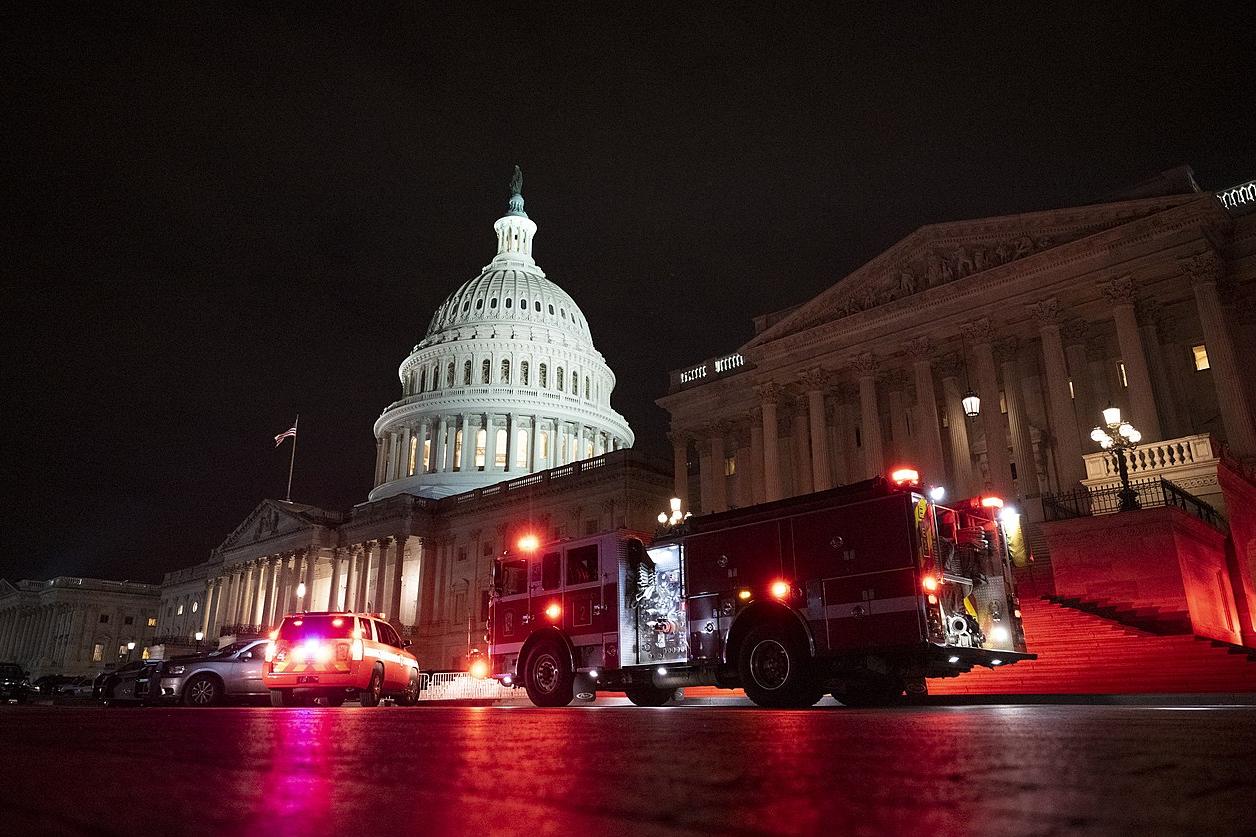
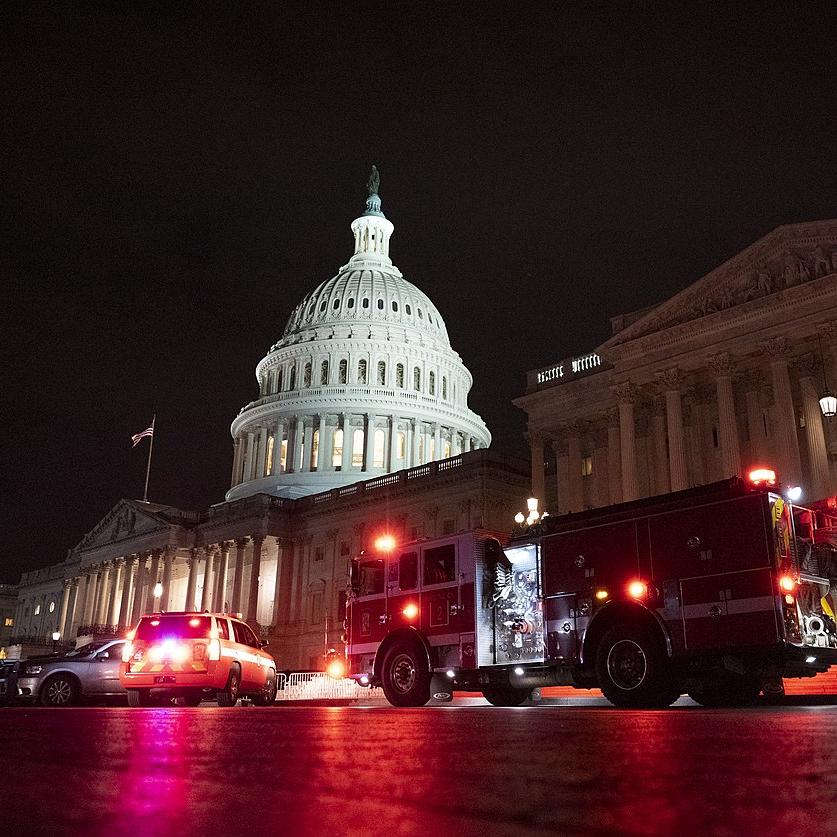
In the wake of the insurrection at the U.S. Capitol on January 6, 2021, many of the most recognized U.S. brands clapped back at the crowd otherwise known as the U.S. election deniers — generally by announcing they would stop, or “reexamine,” giving any donations to their campaigns. Many were surely chastened by the ties they had to many of the rioters who defaced the Capitol while threatening the lives of both Republican and Democratic leaders.
Two years later, it appears that promise has been largely forgotten. Accountable.US crunched the numbers and found that 50 companies within the Fortune 100 that had pledged to stop any campaign contribution to the 2020 election deniers have changed their tune, a shift that amounts to almost $5.5 million in total.
In total, corporate donations linked to companies that had at one time called out election deniers on Capitol Hill amounted to just over $10 million during the past campaign season, according to analyses by Accountable.US and other watchdog groups.
“So many corporations sought recognition for halting political spending after January 6, then quietly reopened the money spigot to election deniers when they thought no one was paying attention,” said Jeremy Funk, the media relations director of Accountable.US, wrote in an emailed statement to TriplePundit. “Companies that claimed to be allies for democracy then rewarded millions to lawmakers that tried to finish what the insurrectionists started have shown they were never serious.”
The A-to-W roster of companies cuts across just about every industry, from healthcare to insurance to retail to technology. The list of companies that have resumed political donations includes Allstate, Cigna, GM, Lockheed Martin, Raytheon and UPS.
In fairness, there are companies that have kept their word so far when it comes to refusing to send donations to election deniers, including AIG, Coca-Cola, HP, Nike and Target.
As Politico pointed out, for many of the 147 members of Congress who sought to overturn the 2020 election results, that $10.2 million in aggregate corporate contributions is a small percentage of what these politicians raised during the 2022 midterms campaign — political donations to them made in total surpassed more than $350 million.
Nevertheless, for many of these election deniers, such contributions from these companies hardly amounted to chump change. Take Kevin McCarthy, the presumptive Speaker of the House for the 118th Congress (presumptive as off press time), who spoke out immediately after the Capitol Riots, then soon flew down to Florida to visit former president Trump to make amends and has since been adamant in denying that any harm was done during the January 6 insurrection — Politico’s Jessica Piper and Zach Montellaro concluded that McCarthy raised $285 from political action committees (PACs) linked to companies that had spoken out against election deniers two years ago.
“The rhetoric that fed the riots has continued to be embraced by scores of Republican politicians, and they in turn have been kept in the fold by some of the big outside interests who condemned their position at the time,” wrote Piper and Montellaro earlier today. “The turnaround also raises questions about what the corporations that paused contributions and later turned them back on were hoping to accomplish with their stand — besides a fleeting PR win.”
Many U.S. companies already appeared to put the Capitol riots in the rearview mirror less than a year after they occurred. Here's what companies could do instead, as 3p’s Tina Casey wrote one year ago as she called out corporate America for “sitting on their hands” rather than continuing to take a stand for U.S. democracy.
“Leading U.S. corporations spend billions each year to convince the buying public to buy what they’re selling,” said Casey, adding, “They could make a difference by spending a fraction of that on [campaigns] that help convince the voting public that violent insurrection is wrong, that the peaceful transfer of power is the bedrock of American democracy, that voter fraud is virtually nonexistent, and that every U.S. citizen age 18 and over should have equal access to the ballot box.”
Image credit: U.S. DHS via Wiki Commons
3p’s Crystal Ball for 2023: The ESG Trends We See for The Coming Year


This list may be force us to eat crow (or a plant-based alternative) at the end of the year, but based on what we saw in 2022, and some of the chatter going on in the present —not to mention the macroeconomic trends that will surely affect the world of ESG — we’ve got a list of six trends that will likely define ESG during the coming year.
We’ll mix it up by reversing this acronym, starting with the “G” (governance), “S” (social) and finally working our way to the “E” (environmental).
Boards will further buy into the case for a diverse workforce
The outcome on how proxy statements related to diversity during the 2022 proxy season was mixed, but here’s one fact that can’t be overlooked: Issues related to DEI (diversity, equity and inclusion) was amongst the most common of the shareholder proposals that investors voted on last year. Further, proposals calling for racial equity audits witnessed a boost in success, with the average percentage of support jumping from 33 percent to 45 percent from 2021 to 2022, says the Harvard Law School Forum on Corporate Governance.
Further, despite all the chatter about a recession, companies are still stepping over each other in their push to secure the proverbial pipeline of talent. How can that be achieved? Ensuring that hiring practices are more transparent will be a start. But companies and the boards leading them will further realize that the old ways of hiring just won’t do anymore.
But don’t think that such a shift will occur just because more corporate executives and board members have “seen the light” on guaranteeing that all workers are treated fairly regardless of their gender, racial background and ethnicity and that it is the right thing to do. If anything, a stubborn labor shortage is in the cards for years, as studies like a recent Indeed-Glassdoor survey have indicated — largely due to the fact that worldwide, birthrates keep declining with no rebound seen anytime soon.
We won’t be spooked anymore by the anti-ESG forces, but…
3p has covered the backlash against the ESG movement here in the U.S. which is a cause for worry across the pond as well, as Europe is also dealing with a surge in anti-establishment, right-wing politics.
But then, the midterm elections happened here in the U.S., and the “Red Wave” we were promised never materialized — a shock to just about everyone except Popular Info’s Judd Legum and our own Tina Casey.
Further, as of press time, the U.S. House still hasn’t elected a speaker, a saga that hasn’t been seen in over 100 years, or to put it all into context, back at a time when just about everyone in Congress looked like someone on a U.S. dollar bill. The GOP, at least on one side of Capitol Hill, will most likely spend the 118th Congress infighting, and when it can agree on issues, there will be bigger fish to fry than whether “woke capitalism” deserves hearings, let alone any legislation. We’ll see more U.S. states try to put the kibosh on ESG investing, but such action will only be limited to a handful of state capitals.
Plus, the wind is at the backs of the supporters of ESG. Not that ESG is infallible — to start, it’s still widely misunderstood by much of the public — but it’s become the lingua franca of more and more investors, and in the end, they are who corporate leaders and boards of directors are going to listen to when push comes to shove.
Nevertheless, a shift is underway in how ESG is communicated
The recent COP27 climate negotiations in Egypt left many of us underwhelmed — and so called “achievements” such as giving Indigenous communities more of a voice and the funding of climate projects for poorer countries were in reality policies that should have been enacted years ago. Nevertheless, one success it had was highlighting the need for a “just transition,” i.e., ensuring that any shift to a low- or zero-carbon economy is equitable and benefits all citizens, not merely for those who are white and have the fattest checkbooks.
Among the arguments for a just transition framework is that it would push companies to show how they are integrating their climate action with their social impact work; there is no pathway toward silos as one that in contrast could emerge within an E, S and G structure. When describing a company’s work around a just transition, it would behoove them to focus less on the “what” and more on the “why” and “how.” Among the hypotheticals, it wouldn’t be enough to talk about switching from coal-based power to renewables. Instead, professionals should look to ask (and answer) questions like: What could be done for job retraining in the communities affected by such a switch, and how will companies prevent waste from such projects ending up in landfill sites near communities of color?
A disclosure framework based on a just transition doesn’t mean companies would have to rip up the guidelines that they use now; but it would behoove them to show how their operations are generating true social impact and purpose — and if not, they'd need to explain why not.
Companies can’t ignore their employees’ mental health any longer
It seems that you can’t get on any platform such as Spotify, YouTube or even play games like Words With Friends on your phone without seeing messaging or advertising about mental health.
Most of these ads sound like, eh, advertisements — but that doesn’t take away from the fact that mental health has long gotten the short shrift in the workplace.
The tussle between the forces who wanted a return to the office versus those who wished to continue working from home was partly responsible for this increased interest in taking care of one’s mental health. For every worker who missed office “collaboration” and the fragrance of whiteboard markers in stuffy conference rooms, there was someone who didn’t miss the microaggressions and additional awful behavior that got in the way of them reaching their full productivity and potential.
We can thank Millennials and Gen Z employees, who by and large have been very comfortable saying, “I need to take care of my mental health.” Watch for companies to respond in kind: Benefits packages will need to go beyond competitively priced health care premiums and other perks.
The circular economy is dead
It’s hard to say something is or will be “dead” when the reality was it was never alive in the first place, and that includes the circular economy. Watch circularity dig its own space within the sustainability lexicon graveyard, joining other terms like “net-zero.” Like net-zero, the circular economy sounded fantastic in practice: after all, it is regenerative, zero-waste and could unlock new economic opportunities.
Two things got in the way of circularity. First, the global pandemic resulted in the proliferation of single-use plastics, due to our fear of catching the virus from surfaces or coming into close contact with others. Disruptions in how things moved along, including global supply chains, certainly didn’t help.
Second, circularity is proving to be structurally impossible. We can’t export our garbage to China anymore, so many municipalities were tasked with managing “recyclables” at a rate that was impossible. If you lead waste management at a city or county, or are you going to try to figure out what to do with all those items, or will you just bury it (which can result in a lower carbon footprint)? Further, there are too many types of plastics out there. Until single-use plastic items can be uniform in composition, such as glass and aluminum, forget it. Big companies generally don’t want to take action, and government leaders don’t have the stomach to make hard decisions — and lobbying from business groups isn’t helping on that front.
Even the Ellen MacArthur Foundation, the most respected organization out there promoting the circular economy, shows that any progress so far on circularity is tepid at best — and it is resigned to the fact that any such targets by mid-decade aren’t going to happen.
More investments in clean energy, and not necessarily in wind or solar
It’s no longer big news: Renewables keep enjoying a steady uptick in how much they contribute to the world’s energy portfolio, including here in the U.S. Corporate investments in massive wind or solar installations? That’s old news.
With the excitement over new developments in nuclear fusion, it’s only natural that there’s renewed hope for a low-carbon economy. For example, Tina Casey has long been tracking the innovations in the green hydrogen economy in the U.S. and abroad. This source of energy, if it can be harnessed to scale, has applications beyond providing power for buildings or fuel for cars. It has all kinds of uses within industry and farming, too.
Watch for more companies to dabble in such investments, partly because of the “wow” factor when it comes to communications — who wouldn’t want to stand out with a bold next-gen energy announcement?
Image credit: Anika Huizinga via Unsplash
The Return of Lula Gives Some Breathing Room to the Brazilian Amazon


The Palácio da Alvorada, the official residence of Brazil's president in Brasília, Brazil
His presidency witnessed spectacular economic growth and his social welfare policies by many accounts lifted as many as 20 million Brazilians out of poverty. But his successor ended up impeached in 2016 and soon after, he started a prison term that lasted 580 days due to corruption charges. He then witnessed the “Trump of the Tropics” win the 2018 presidential election and for the next four years, saw many of his policies reversed. But now Luiz Inácio Lula da Silva — known as Lula to his supporters — has made his return to the Palácio da Alvorada, the President of Brazil’s official residence.
Sworn in on New Year’s Day, one of Lula’s first decisions was to restore the regulatory authority of the country’s environmental watchdog. That agency, Ibama, had been defanged under his predecessor, Jair Bolsonaro, a policy critics said helped contribute to the devastating wildfires that were partly responsible for the loss as much as 11,000 square miles of Amazonian rainforest in recent years.
Lula's new presidential cabinet indicates a 180-degree turn away from the policies under Bolsonaro. To start, he named Marina Silva, a 2010 Green Party presidential candidate and who for years has been committed to stopping deforestation in the Amazon, as his environmental minister again (Silva had the same role in Lula’s presidency from 2003 to 2008, but she resigned her post when he started to take keener interest in supporting Brazil’s agribusiness sector).
In addition, Lula reinstated the Amazon Fund during his first day back in office. Launched in 2008 but shuttered a decade later during Bolsonaro’s presidency, the fund had been tasked with monitoring activities in the Amazon, particularly ones committed to stopping deforestation. Lula’s swift relaunch of the fund led more governments to respond in kind, starting with Norway’s climate and environment ministry, which almost immediately announced an approximate $500 million (6 billion kroner or about 3 billion Brazilian reals) donation. The next day, Germany’s government pledged an additional $37 million (35 million euros) contribution to the Amazon Fund.
In another signal that the Brazilian government is committed to restoring the region’s rainforests, yesterday a coalition of regional governments announced that it is seeking to host COP climate change meetings within the Amazon in 2025.
So, what do these environmental policy changes mean for companies with supply chains in Brazil — particularly for ones in sectors such as soy and beef that over the years have promised their own voluntary commitments to curb deforestation?
To start, it is clear that corporate pledges to prevent the loss of rainforests across the Brazilian rainforest have added up to little more than public relations talking points. During the previous administration, leaders of global corporations could simply look the other way: After all, Bolsonaro was on the record of actively encouraging people to clear the Amazonian rainforests. But in his inaugural address on Sunday, Lula promised a zero-deforestation policy during his term in office; a tall order indeed, but it sends a signal to companies with ties to the region.
“The victory of Luiz Inácio Lula da Silva in the Brazilian presidential election has been welcomed as a positive step in reducing deforestation in company supply chains but the opportunity remains for procurement to do more,” wrote Will Phillips for Supply Management, a leading procurement publication, shortly after Lula’s election last October.
A study released during the closing days of the Brazilian presidential resolution confirmed any assumption that voluntary pledges to deforestation in the Amazon had amounted to almost zero action. A team of researchers from the University of Cambridge, Boston University, ETH Zurich and New York University concluded that long before Bolsonaro’s presidency, global corporate promises to end the procurement of any soy linked to deforestation were ineffective. In fact, during a nine-year period from 2006 to 2015, such pledges only amounted to preserving about 890 square miles of rainforest — less than the land mass in Rhode Island, the smallest U.S. state. To put those deforestation “commitments” into perspective, the Amazonian basin comprises about 2.7 million square miles, or about 2,224 Rhode Islands (if you include the tiny state’s water ways).
The bottom line is that if companies believe that they can offer excuses for any links to deforestation within Brazil, the new administration’s actions within its first week suggest otherwise. Environmental activists, as well as those fighting for Indigenous rights in the Amazon, endured a huge spike in violence during the previous administration; they will now only be emboldened to take a stand against any illegal land clearing or mining within the region. The time to not only commit, but to become proactive and take steps necessary to stop any deforestation in the region, is this week. It’s not only Brazil’s federal government that has shifted its deforestation gears, as local and regional governments will feel empowered to assert their regulatory power as well.
Image credit: Daniel Duarte via Unsplash
Eating your Vegetables: The Power of a Vegan Diet


I’ve gone through my fair share of plant-based cookbooks in my life: quirky, bohemian guides, voluminous tomes of tofu and vegetables, and a few sensible sets of recipes. When I first became a vegetarian, mentioning the fact would prompt people to look at me curiously and then recite a long list of meats to see which one I’d eat. Thankfully, we’ve moved on. We now have a mind-boggling variety of plant-based products at our fingertips, but a quality vegan cookbook is still rare.
I recently reviewed a new one, Plant-Based on a Budget: Quick and Easy. Written by the blogger Toni Okamoto, this vegan cookbook — set to be released on March 13 — complements her vegan recipe website and existing collection of plant-based cookbooks. It starts with a guide to food storage, useful kitchen tools, and other ways to save time and money. The first recipe I tested was the vegan buttermilk biscuits; they were easy to make, buttery, and surprisingly delicious. The recipes in the book all followed this pattern: simple, quick, and tasty. Better yet, they required no unusual ingredients and were designed for busy cooks. At first glance, I was dubious these uncomplicated recipes would taste good, but I was proven wrong (time and time again)! Even the carnivorous members of my household enjoyed these dishes.
Why eat a vegan diet?
Tastiness aside, a vegan diet has a multitude of benefits. For starters, it's hardly news that it can be quite healthy. Studies have found that eating a healthy, plant-based diet can reduce your risk of heart disease, diabetes, high blood pressure and certain types of cancer. Vegetarians tend to have a lower body mass index than those who eat meat. It can also be an economical choice. It’s no wonder this diet has been rapidly growing in popularity in the U.S.
Vegan products also contribute to our economy. The plant-based food industry (which, to be clear, produces food without any animal products) is a fast-growing one. In the U.S., this industry contributed nearly $17 billion to the economy and created over 60,000 jobs. And global sales of plant-based dairy and meat are expected to reach $162 billion by 2030. On the other hand, a recent study, analyzing the number of premature deaths caused by air pollution, found that U.S. farms may cost more in health and environmental damage than they contribute to the economy.
The petite footprint of a vegan diet
A vegan diet is also beneficial for the planet. While producing plant-based food has a carbon footprint too, it’s much smaller than meat. Take, for instance, one of the worst types of meat for the planet: beef. Producing one pound of beef generates 57 times the amount of greenhouse gasses than a pound of potatoes does. Cattle emit methane, a powerful greenhouse gas. They also require large amounts of feed to grow, around 10 pounds of plant protein for each pound of beef, which releases additional greenhouse gasses. In addition to their sizable carbon footprint, livestock and dairy farms use copious amounts of water. Finally, they also produce large amounts of waste, some of which cause water pollution in surrounding areas.
All those emissions mean skipping meat is good for the planet, extremely so. A recent study found that phasing out animal agriculture over the next 15 years would cut carbon dioxide emissions by 68 percent by the end of the century. This one change would achieve half the greenhouse gas emission reductions needed to limit global warming to 2° C by 2100. That’s the minimum threshold required to avert the worst effects of climate change.
Eat your veggies
Given the availability of plant-based options over meat, it’s never been easier to eat lower on the food chain, which benefits the planet and your health. Even small actions, like eating plant-based products more often, are a step towards sustainability and a healthier environment. And it doesn’t need to be hard. Picking up a vegan cookbook, like Toni Okamoto’s, is a great way to incorporate more vegan dishes into your diet.
Image credits: Toni Okamoto
How BlackRock and Ukraine are Ending the Anti-ESG Movement


Ukraine has enlisted a branch of the world’s leading financial firm, BlackRock, to help steer its reconstruction plans. The outcome is shaping up to be validation for ESG investors and a loss for U.S. politicians who have been leveraging the “woke capitalism” canard on behalf of fossil energy stakeholders.
The anti-ESG movement: fossil energy wolf in sheep’s clothing
The derogatory term “woke capitalism” is widely attributed to an opinion piece written by the conservative pundit Ross Douthat in 2018. He argued that the ESG (environment, social, governance) movement merely papers a veneer of progressivism over the same old business practices.
With that argument in hand, Republican policy makers have accused ESG funds of currying favor with Democratic lawmakers and their donors while mishandling their fiduciary duties and harming shareholders.
Without clear evidence of harm, however, the anti-ESG movement simply exists to mollify fossil energy stakeholders and quash clean energy investment, while tapping into the fear, resentment and religious extremism that motivates today’s Republican base voters.
Editor's note: Be sure to subscribe to our Brands Taking Stands newsletter, which comes out every Wednesday.
It's no accident that Republican officials in multiple states have singled out BlackRock for attack. BlackRock CEO Larry Fink has been a high-profile advocate for global decarbonization.
“Most stakeholders – from shareholders, to employees, to customers, to communities, and regulators – now expect companies to play a role in decarbonizing the global economy,” Fink emphasized in his annual letter to shareholders last year.
Woke or not, ESG investing is a permanent fixture
The anti-ESG movement appears to have had some effect in recent months. However, the case for businesses to cultivate an ESG profile is rooted in powerful demographic trends, and corporate decision makers are responding to those broader social and cultural shifts.
“Corporate sustainability teams are increasingly at the center of important business discussions, based on an intensifying stakeholder focus on ESG issues, expanding investor expectations, and shifting approaches to climate change and regulation,” Morningstar analyst Alli McCallion affirmed last month. She cited a recent Morningstar survey in which 90 percent of companies reported they had a formal ESG strategy either in hand or under development.
The well-known ESG advocate Robert Eccles also argued along similar lines, in an open letter to “all Republicans who are concerned about ESG” published by Forbes on January 1.
“ESG isn’t what some on the left hope it to be. It isn’t what you on the right fear it to be. It’s simply about managing material risk factors for shareholder value creation,” Eccles wrote, underscoring the key role of transparency and objectivity.
BlackRock FMA and the prospects for an ESG-friendly reconstruction in Ukraine
BlackRock’s new relationship with the government of Ukraine also underscores the weakness of the case against ESG investing.
The arrangement comes under the BlackRock Financial Management Advisory group, which it emphasizes is a separate and independent branch of the firm.
The services provided by BlackRock FMA fit neatly into the transparency and objectivity framework expressed by Eccles and other ESG advocates.
“Financial Markets Advisory (FMA) provides a differentiated range of advisory services by leveraging the firm’s capital markets, data and risk analytics, technology, and financial modeling capabilities while maintaining stringent information barriers,” BlackRock states.
The arrangement with Ukraine was formalized in a Memorandum of Understanding (MoU), announced by BlackRock on November 16. Under the terms of the MoU, BlackRock FMA advise Ukraine’s Ministry of Economy on “establishing a roadmap for the investment framework’s implementation, including identifying design choices for the envisioned setup, structure, mandate and governance.”
A green recovery for Ukraine
All else being equal, Ukraine’s postwar recovery could focus on exploitation of its vast, largely untapped natural gas reserves. However, there are strong indications that the nation’s future energy profile is heading in a different direction under guidance from BlackRock FMA.
Although BlackRock FMA is structured as an independent entity, the agreement with Ukraine derives from discussions held last fall between Larry Fink and Ukrainian President Volodymyr Zelenskyy.
In addition, BlackRock credits Andrew Forrest, the founder and former CEO of Fortescue Metals Group, as being “instrumental” in facilitating discussions between BlackRock FMA and the government of Ukraine. Forrest continues to serve as non-executive chairman of Fortescue along with his other business interests.
Forrest’s involvement in the Ukraine talks is significant because Fortescue has positioned itself to be a leading driver of the global energy transition. The company announced an ambitious decarbonization plan last fall, with a strong focus on the global green hydrogen market.
Fortescue already has set the wheels in motion for scaling up green hydrogen production around the world, including here in the U.S. In September, Fortescue announced that its Fortescue Future Industries branch has launched an $80 million, 10-year investment program with the U.S. Department of Energy’s National Renewable Energy Laboratory, aimed at spurring “strong increase in manufacturing in the green industrial ecosystem.”
A green (hydrogen) recovery for Ukraine
Ukraine is also in position to kickstart its green hydrogen industry. Last summer Ukraine laid the groundwork for joining the European Union as a supplier of renewable energy and green hydrogen, and last September Andrew Forrest announced that he is personally banking on a green recovery for Ukraine.
In a press release issued by his family owned Tattarang Group, Forrest announced that he is providing $500 million in seed money for a new, $25 billion fund called the Ukraine Green Growth Initiative, with the support of President Zelenskyy and the government of Ukraine.
“This investment fund will focus on primary infrastructure such as energy and communications to build a digital green grid, so Ukraine can become a model for the world as a leading digital green economy,” Tattarang Group emphasized.
President Zelenskyy also indicated a focus on decarbonization, stating that Ukraine will “take advantage of the fact that what the Russians have destroyed can readily be replaced with the latest, most modern green and digital infrastructure.”
The BlackRock connection also surfaces in the new fund. Prior to setting it up, Forrest consulted with Larry Fink along with U.S. President Joe Biden and the leaders of the U.K. and Australia, as well as international organizations.
Who’s the ‘wokest’ of them all?
Forrest’s pitch for the new fund also included a ringing endorsement of ESG principles on a global, geopolitical scale.
“I invite professional investors, fund managers and sovereign funds and all who believe invading another country should now be forever consigned to the historical garbage bin of humanity’s worst mistakes, to join us,” he stated.
Forrest is far from alone. Russia’s murderous rampage through Ukraine sparked a massive, global corporate boycott against the country, propelled by a combination of reputational risk and international sanctions.
Against this backdrop, the newly minted Republican majority in the U.S. House of Representatives is still moving forward with plans to hold hearings on “woke capitalism.” If they are aiming to expose anything, though, it will most likely be the fact that ESG investing is not only beneficial but inevitable.
Image credit: Anastasiia Krutota via Unsplash
Will 2023 Be the Year Greenhushing Becomes a Thing?


As the new year rolls in, expect to see more debate over greenhushing — that is, brands saying very little, if anything, about their sustainability work over concern they could get called out for “greenwashing.”
Among the reasons why greenhushing has entered the corporate sustainability lexicon is a recent South Pole survey that studied the work of more than 1,200 private companies worldwide. The research found that about one in four of those companies are now deciding not to discuss their climate change work barely, if at all.
So, while many chief sustainability officers will wring their hands at all this commentary and wonder how, how often and what to communicate yet again, there is a relatively simple strategy to curb the risks of being tagged with the greenhushing or greenwashing labels.
Sigh, that fear of being tagged as a greenwasher
“Welcome to the damned-if-you-do, damned-if-you-don't world of sustainability communications,” Joel Makower, the chairman and co-founder of GreenBiz, wrote last fall. Such frustration is understandable. Who wouldn't throw their hands in the air when confronted with the possibility that a comms professional isn't communicating enough?
Editor's note: Be sure to subscribe to our Brands Taking Stands newsletter, which comes out every Wednesday.
Other leaders have sounded their concerns over greenhushing.
Noting that brands such as McDonald’s and Volkswagen had their share of headaches over accusations of greenwashing, Jonathan Small of Entrepreneur Magazine is among the commentators who have suggested that decisions to slow down any publicizing of corporate sustainability work could be a hallmark of 2023.
Why would greenhushing even be an option?
The World Economic Forum (WEF) has also weighed in on the decision of more companies to lean toward silence rather than steady communications on their sustainability work as no company wants greenwashing accusations hurled in their direction. “Heightened sensitivity to such scrutiny might speak to the idea of not speaking at all,” wrote WEF’s John Letzing in November.
The U.S. is the perfect cauldron for greenhushing, in part due to rising anti-ESG rhetoric and even legislation coming from the far right — and it doesn’t help that many U.S. citizens know relatively little about ESG in the first place. If you don’t wish to incur the wrath of some politicians and also avoid a yet another social media flareup, it’s only logical that sustainability communications professionals would prefer to keep their heads down and go light on the press releases.
Nevertheless, companies shouldn’t be fearful of making too much noise — rather, they should focus on making less of one specific type of noise.
Less talk on goals, more attention on action
Here’s the deal: Companies are often quick to make bold proclamations about their sustainability goals. We’ve reached a point at which, quite frankly, all of the press releases read and sound the same after a while. And, if during 2023 a reporter covered in detail a company's climate action goal for 2030, what are the chances he or she will be around that same publication for a follow-up seven years from now? Or, who would even remember they wrote such a story down the road?
Witness the deluge of net-zero announcements in recent years. Together, all of these commitments sound impressive; the problem, however, is that many companies are nowhere near reaching these climate action goals. Further, one huge roadblock is that many of these promises rely on technologies that aren’t yet viable.
It also doesn’t help that one report from October found that of the world’s 160-plus most polluting companies, 80 percent of them have not made any science-aligned climate targets. That adds to the cynicism surrounding corporate sustainability, and makes it more difficult for the corporate sustainability professionals who are genuinely committed to taking on problems such as climate change.
The bottom line is that we need less talk about goals and more discussion about actions and accomplishments. Anyone, any company, in all honesty can set a goal — the hard part is actually the incremental progress is needed as 2030 and 2040 draw closer. Corporate leaders need to understand that their stakeholders want to see results, even if they are modest. And if a company falls short of a climate action goal, it’s fair to disclose why that goal wasn’t met and what challenges were involved.
The problem isn’t that companies are communicating their sustainability work too much. It’s that there has been too much emphasis placed on goals and not enough updates on the hard work being done.
Image credit: Andrea Piacquadio via Unsplash